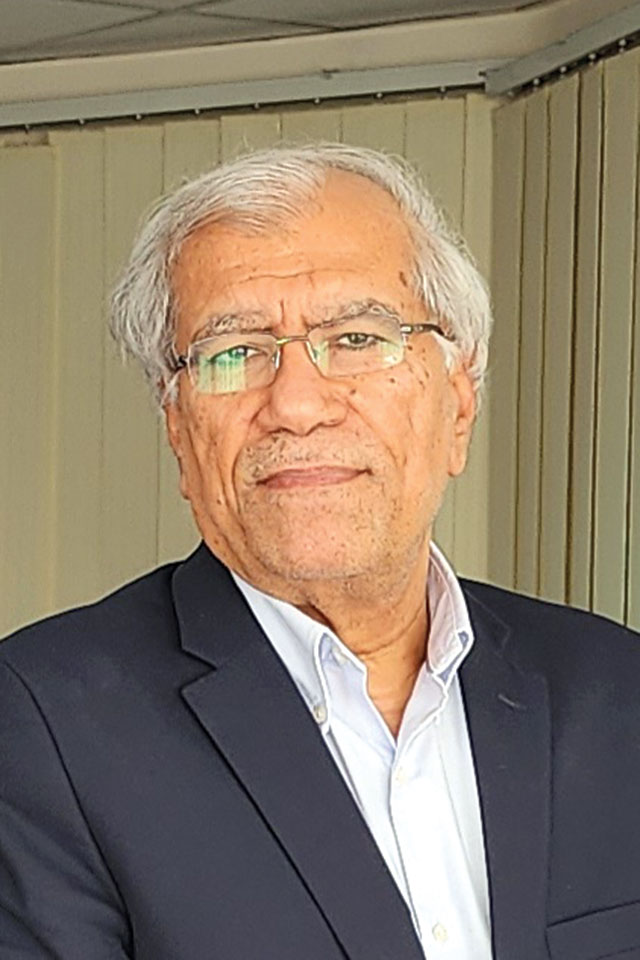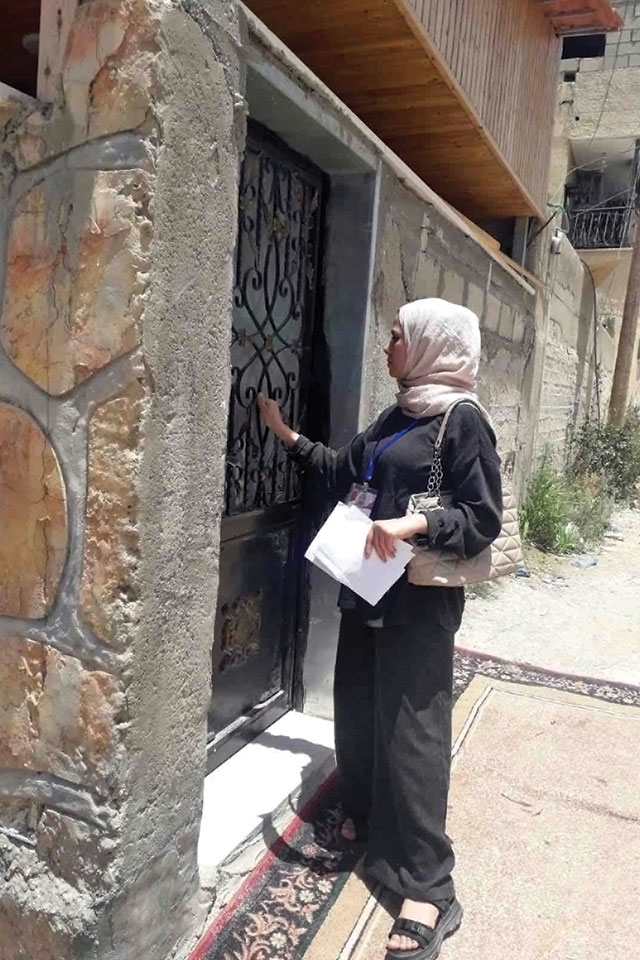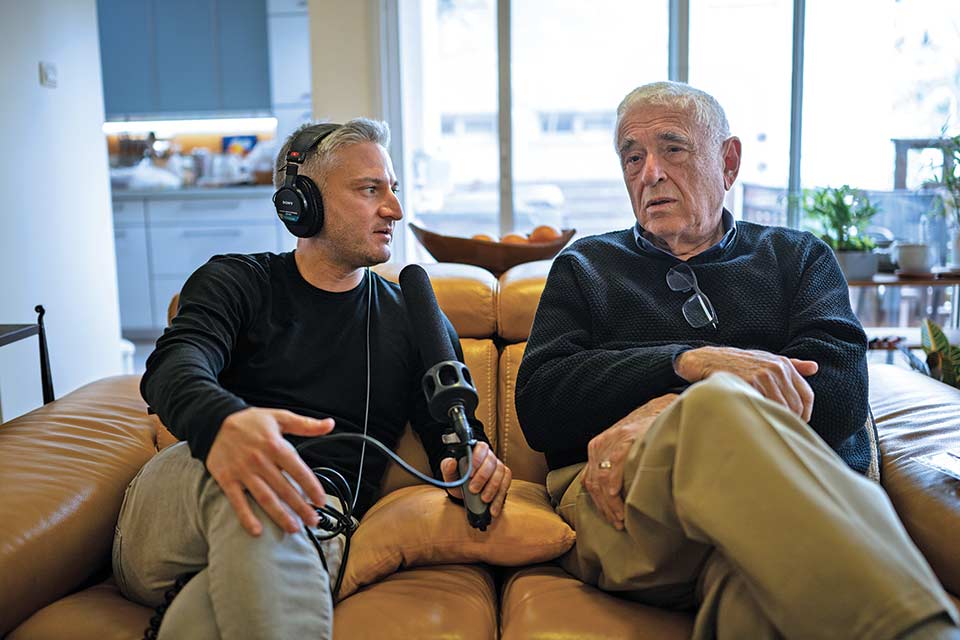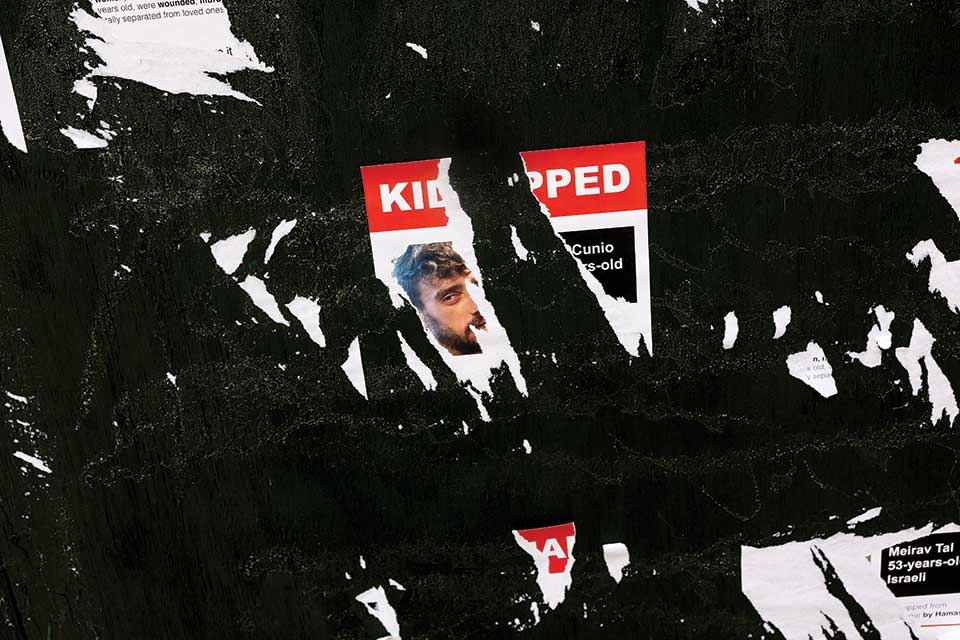‘We Must Not Lose Hope’
A Crown Center fellow is conducting polls of the Palestinian people. He believes peace is still possible.

By Danna Lorch
Tallying public opinion as a war rages around you would seem next to impossible.
But that’s exactly what pollster Khalil Shikaki, senior fellow at Brandeis’ Crown Center for Middle East Studies, is doing: surveying Palestinians in Gaza and the West Bank during the Israel-Hamas war.
Shikaki has dedicated his life to documenting Palestinian public opinion and sharing his objective empirical data with communities, policymakers, and academics. His most recent survey, the 91st opinion poll he’s conducted in Gaza and the West Bank, was arguably the most personal one of all.
The Gaza-born Shikaki and his wife have family living in the northern part of the strip. “I worry about them and wait every day to hear whether they are alive,” he said during a Zoom interview from his home in Ramallah, in the West Bank. As he spoke, he glanced down every few minutes to refresh his WhatsApp.
Whenever a relative accesses enough electrical power to charge a phone and text an update, Shikaki exhales. Still, “some days, we hear bad news — that not everyone is accounted for, or they lack food or water,” he says. “There is no safe place for them to go, and the hunger being felt, especially in the north, is very real.”
A leading Palestinian academic, Shikaki has worked back channels to promote peace between Israelis and Palestinians for more than three decades. “For people like me, this war is a personal defeat,” he says, shaking his head. “Despite our efforts and good intentions, people are dying.”
Shikaki founded the Palestinian Center for Policy and Survey Research, an independent nonprofit, in 1993. After earning a PhD in politics at Columbia University in 1986 and beginning his first teaching position — in Nablus, a Palestinian city in the West Bank — he discovered there was no empirical data to reference in his classes on Palestinian domestic politics.
“My students were divided into two groups, almost right down the middle,” when it came to “what they assumed were society’s values,” Shikaki says. “They believed everyone thought exactly like them.” So he became a pollster to better understand the pluralism of opinions and beliefs in Palestinian regions and communities, even among members of the same family.
Over the past 31 years, Shikaki has designed and directed more than 300 surveys, averaging nine annually, and conducted more than 360,000 individual face-to-face interviews with Palestinians living in Gaza and the West Bank.
Shifting political allegiances
 Khalil Shikaki (Photo Credit: Courtesy Khalil Shikaki)
Khalil Shikaki (Photo Credit: Courtesy Khalil Shikaki)
The survey responses Shikaki has collected have become part of a searchable database. He can tabulate yearly trends in Palestinian society and politics with the touch of a fingertip, identifying patterns in people’s reactions and shifts in attitudes over time. “I can see how things have changed — and, most important, why they have changed and with what drivers,” he explains.
During the current war’s ceasefire — from Nov. 22 to Dec. 2, 2023 — Shikaki and his team of data collectors took advantage of the lull in fighting to conduct their first poll since the Hamas attacks on Oct. 7. Anticipating another ceasefire (which ultimately didn’t happen) during the first days of Ramadan, they carried out a second poll on March 5-10. It measured Palestinian political attitudes since the war’s outbreak, asking participants largely the same questions that were asked in the December poll to measure changes in attitude.
The March poll’s sample size was 1,580 Palestinian adults, with 750 interviews taking place in person in Gaza in 75 different locations (mostly private homes, as well as tents and shelters operated by the United Nations Relief and Works Agency and the Hamas-led government). The other 830 interviews took place in the West Bank, a territory Shikaki predicts “could explode at any moment, if conditions continue to deteriorate.”
With the widespread economic destitution, coupled with increasing Israeli settler violence, Shikaki says, “West Bankers were very angry there was no attempt by the Palestinian Authority to deliver humanitarian services to Gaza.” In March, just 11% of West Bankers reported they and their immediate families felt secure.
In December, support for Hamas in the West Bank had tripled over a September 2023 poll. By March, it had dropped 11 percentage points. Meanwhile, Palestinian Authority prime minister Mohammad Shtayyeh and his government resigned in late February. A resounding 90% of those polled in March said they would support the resignation of the Fatah party’s Mahmoud Abbas as well.
The March poll also posed a number of hypothetical ballot scenarios for a fair and democratic national unity election following the war. The most noteworthy shift was an increase in support for Marwan Barghouti, the charismatic Fatah politician widely regarded as the leader of both the First and Second Intifadas. In a hypothetical contest between Barghouti and Hamas’ Ismail Haniyeh, poll results predicted Barghouti, who was convicted of murder by an Israeli court and is currently serving a life sentence, would win with 62% of votes.
The statistics of tragedy
Shikaki and his colleagues work carefully to ensure the Palestinian Center for Policy and Survey Research builds trust everywhere it polls. All interviews are conducted face-to-face by extensively trained data collectors who live in the communities in which they poll.
“People have to allow you into their household, welcome you into their living room, and talk to you as if they are whispering in your ear,” Shikaki says. “They have to be convinced of total anonymity for themselves and the answers they provide.”
He says Palestinians who consider their views moderate falsely assume they are in the minority. In reality, their views often represent the majority.
“When you are in the majority but believe you’re in the minority, you stay silent and do not raise your voice,” he says. “You allow a small minority of extremists to dictate policy.” That’s why he publishes his survey results on the center’s website, emails them to an extensive mailing list, and makes them available to local media that serve the communities the center works within.
The December survey results showed that 80% of Palestinians in Gaza believe that killing women or children, regardless of background, is unacceptable. Yet 72% of them supported Hamas’ invasion on Oct. 7. (In the survey’s English version, “invasion” is translated from Arabic as the “offensive.” In Israel and the U.S., it is commonly referred to as a “massacre” or an “attack.”)
In the March poll, a staggering 78% of Gazans reported a family member had been killed or injured in the war — a 16% increase over the December poll. Consistent with that earlier poll, 55% reported not having enough food for even the next day.
Eighty percent of those polled (compared to 85% in December) said they hadn’t viewed video footage of the Oct. 7 massacre. How is that possible? Sixty percent of respondents said the media outlets they follow did not post the footage; the other 20% said they refused to view the footage even when it was available.
Likely as a result, just 7% believed Hamas committed atrocities like the mutilation, rape, and murder of Israeli civilians.
Violence breeds more violence
Even before the war, Shikaki observed a gradual rise in support for armed struggle among Palestinians polled.
“Hamas benefited from that,” he surmises. Of Gazans asked in March which party should govern the strip after the war, nearly 59% said it should be Hamas (52% in Gaza and 64% in the West Bank). These numbers are consistent with a similar question posed in the December poll. In December, just 3% of those polled thought other Arab countries should administer Gaza. This question wasn’t posed in March because that scenario seemed even less a realistic possibility.
Shikaki notes Gazans have had virtually no access to Israeli news sources — and vice versa. As a result, Gazan attitudes have hardened, and so has misperception. “They have absolutely no information about what’s happening to their neighbors who are just a 5-minute drive from where they live,” he says.
When Shikaki looks at how and why Gazans’ attitudes have changed, the “why” data are extremely important. For example, Shikaki has seen support for a two-state solution rise and fall over the years, and pinpointed the drivers.
“I can tell policymakers what could be done to increase support for a two-state solution,” he says. “This is not manipulating public opinion. It is understanding what dynamics are at play to make people suspicious of a particular solution and how to promote conditions that could create greater trust or comfort.”
Of course, he doesn’t have a crystal ball. Asked when the war might end, he says sadly, “You are asking me to predict the future, and I cannot.”
But he does possess the nuanced insight of a seasoned pollster who lives in the region. “I can tell you what is likely to happen under certain conditions,” he says. “In all our surveys, greater support for violence comes when people are exposed to violence — this is even true for children.” For this reason, there is more support for violence against Israel among Gazans, who have been exposed to a higher degree of it than West Bankers.
“If the war continues, it is certainly going to lead to greater support for violence,” he says. “If violence lessens, attitudes will become more rational and less emotional, and people will become more willing to compromise.”
Similarly, hardship plays a role, Shikaki says: “Attitudes harden when people live under difficult conditions, like in this war.”
A kernel of optimism
Throughout his career, Shikaki has fought to create opportunities for peacemaking to eclipse bloodshed. In 1992, he met Shai Feldman, then an Israeli senior research associate at Tel Aviv University’s Jaffee Center for Strategic Studies.
During the Second Intifada (2000-05), the duo formed separate Israeli and Palestinian task forces within the framework of Track Two diplomatic efforts aimed at stopping the bloodshed and advancing proposals to resolve the Palestinian-Israeli conflict.
Also known as back-channel diplomacy, Track Two is a conflict-transformation technique that convenes community leaders and non-state actors (rather than officials) in peacemaking dialogues and confidence-building initiatives outside the public spotlight. It’s often used unofficially to examine potential solutions before more formal proposals are floated between high-ranking officials.
“When you are in the majority but believe you’re in the minority, you stay silent and do not raise your voice,” Shikaki says. “You allow a small minority of extremists to dictate policy.”
Some of the talks orchestrated by Shikaki and Feldman were funded and supported by Canada’s Ministry of Foreign Affairs and later by Norway’s Ministry of Foreign Affairs. Both Shikaki and Feldman were in contact with key Palestinian and Israeli policymakers, and conveyed to them the results of their discussions.
 A data collector knocks on doors in the West Bank in 2023. (Photo Credit: Courtesy Khalil Shikaki)
A data collector knocks on doors in the West Bank in 2023. (Photo Credit: Courtesy Khalil Shikaki)
In 2005, Feldman went on to become the founding director of the Crown Center for Middle East Studies and, later, the Raymond Frankel Professor of Israeli Politics and Society at Brandeis. Shikaki joined the Crown Center as a founding senior fellow.
Humanitarian conditions are too bleak, dangerous, and heated for dialogue now, says Shikaki. However, he is stubbornly optimistic that he, Feldman, and all the others waging peace will find themselves back on the diplomatic track one day, pushing coexistence forward.
Much as Americans mark Sept. 11 as a transformative day, every Israeli or Palestinian who experienced Oct. 7 and the ensuing war is forever scarred and changed, says Shikaki. It’s still too soon to understand the full scope of the horrible “before” and “after” of this time, and the impact on the overall potential for a lasting peace.
Yet among more than a third of Palestinians surveyed in March, there is still a kernel of optimism for the possibility of real and lasting peace. Despite the thousands of civilian deaths and the famine in Gaza, and the deteriorating conditions in the West Bank, 45% of Palestinians polled in both Gaza and the West Bank supported a two-state solution.
Interestingly, in December there was only 34% support. The March increase came with a 27-point increase in support from Gazans, while support held steady with West Bankers.
“We must not lose hope,” Shikaki says. “This isn’t wishful thinking. It’s based on the results of surveys conducted among both societies. Support for reconciliation can, under certain circumstances, materialize even after extreme violence is inflicted by both sides.
“There is absolutely no alternative to peace.”
Danna Lorch is a freelance writer based in Boston.


